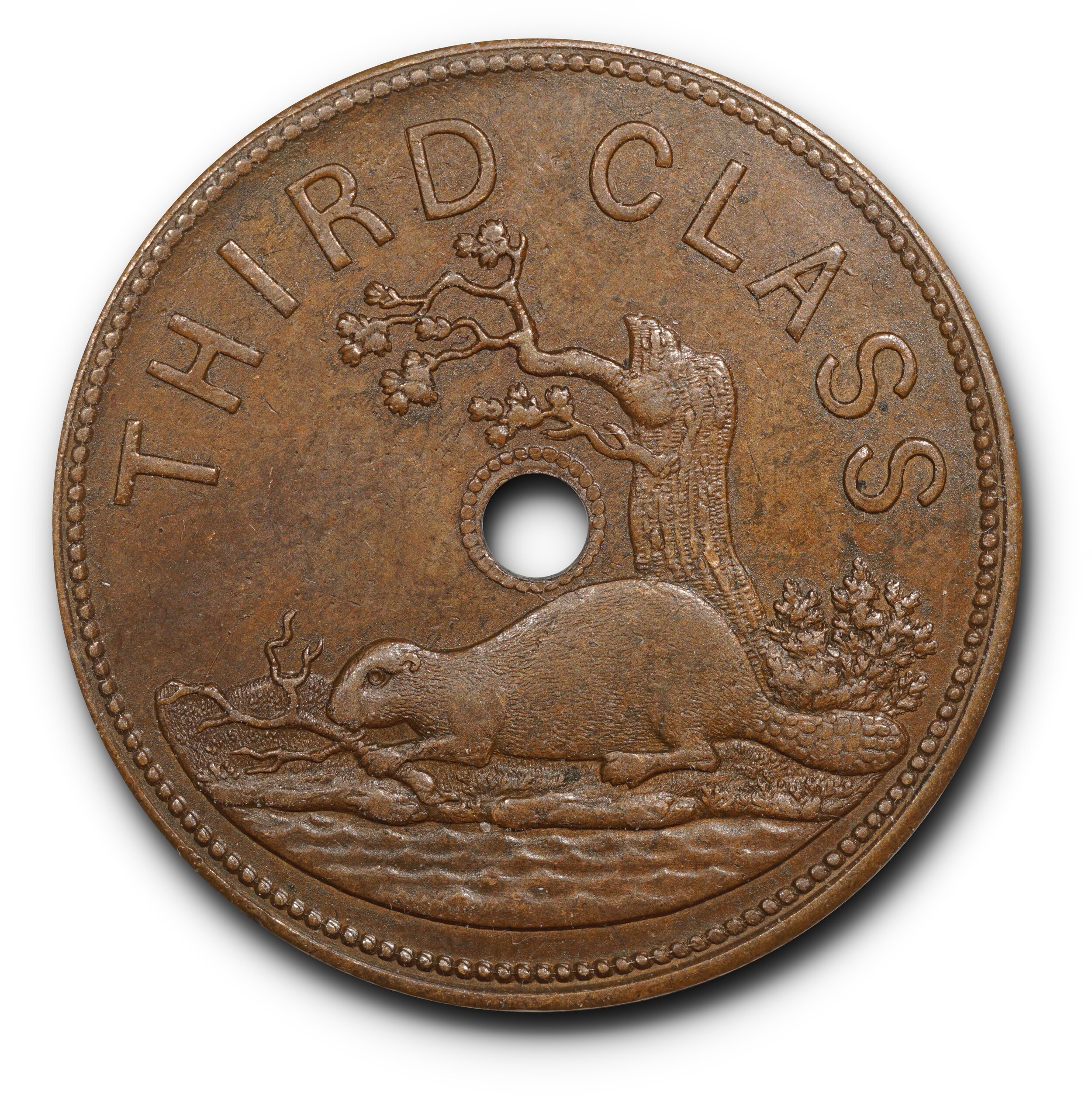(1847) Montreal & Lachine Railroad Company Token, Leroux-600, Breton-530, CH-TR-3, AU.
The Montreal & Lachine Railroad Company token is an iconic Canadian transportation token, issued in 1847 (undated) and probably used through the early 1850s. The Montreal & Lachine railroad ran from Bonaventure Station in central Montreal to Lachine nine miles west of the city centre. The trip took less than 20 minutes and cost 25 cents for a return fare in third class. These copper tokens were chosen over their cardboard tickets counterparts because they would hold up better under hardscrabble condition. Many of the train’s passengers were labourers on the Lachine Canal, including Indigenous workers from neighbouring Caughnawaga on the other side of the St. Lawrence river from Lachine.
The tokens, which feature a central hole so they could be collected and strung on a wire by the train’s conductor, were ordered from Birmingham, England, likely from either Boulton & Watt or Ralph Heaton & Sons. Quantities produced are also unknown, but probably only 200 or so pieces survive, mostly in VF and XF condition. About Uncirculated examples are rarely offered. In 2014, an ICCS MS-60 example realized what is likely an auction record: $4,484 CAD, including the buyer’s premium.
This About Uncirculated example exhibits a touch of cabinet friction on the beaver’s shoulder and at the junction of the tree branch and stump. Both sides are glossy with chocolate and olive-brown tones. Few abrasions for the type, which often shows signs of heavy use and rough handling.
For more information on the Montreal & Lachine Railroad Company and this beloved token, see Fred Angus’s fantastic articles in the November-December 1997 issue of Canadian Rail.
The Montreal & Lachine Railroad Company token is an iconic Canadian transportation token, issued in 1847 (undated) and probably used through the early 1850s. The Montreal & Lachine railroad ran from Bonaventure Station in central Montreal to Lachine nine miles west of the city centre. The trip took less than 20 minutes and cost 25 cents for a return fare in third class. These copper tokens were chosen over their cardboard tickets counterparts because they would hold up better under hardscrabble condition. Many of the train’s passengers were labourers on the Lachine Canal, including Indigenous workers from neighbouring Caughnawaga on the other side of the St. Lawrence river from Lachine.
The tokens, which feature a central hole so they could be collected and strung on a wire by the train’s conductor, were ordered from Birmingham, England, likely from either Boulton & Watt or Ralph Heaton & Sons. Quantities produced are also unknown, but probably only 200 or so pieces survive, mostly in VF and XF condition. About Uncirculated examples are rarely offered. In 2014, an ICCS MS-60 example realized what is likely an auction record: $4,484 CAD, including the buyer’s premium.
This About Uncirculated example exhibits a touch of cabinet friction on the beaver’s shoulder and at the junction of the tree branch and stump. Both sides are glossy with chocolate and olive-brown tones. Few abrasions for the type, which often shows signs of heavy use and rough handling.
For more information on the Montreal & Lachine Railroad Company and this beloved token, see Fred Angus’s fantastic articles in the November-December 1997 issue of Canadian Rail.
The Montreal & Lachine Railroad Company token is an iconic Canadian transportation token, issued in 1847 (undated) and probably used through the early 1850s. The Montreal & Lachine railroad ran from Bonaventure Station in central Montreal to Lachine nine miles west of the city centre. The trip took less than 20 minutes and cost 25 cents for a return fare in third class. These copper tokens were chosen over their cardboard tickets counterparts because they would hold up better under hardscrabble condition. Many of the train’s passengers were labourers on the Lachine Canal, including Indigenous workers from neighbouring Caughnawaga on the other side of the St. Lawrence river from Lachine.
The tokens, which feature a central hole so they could be collected and strung on a wire by the train’s conductor, were ordered from Birmingham, England, likely from either Boulton & Watt or Ralph Heaton & Sons. Quantities produced are also unknown, but probably only 200 or so pieces survive, mostly in VF and XF condition. About Uncirculated examples are rarely offered. In 2014, an ICCS MS-60 example realized what is likely an auction record: $4,484 CAD, including the buyer’s premium.
This About Uncirculated example exhibits a touch of cabinet friction on the beaver’s shoulder and at the junction of the tree branch and stump. Both sides are glossy with chocolate and olive-brown tones. Few abrasions for the type, which often shows signs of heavy use and rough handling.
For more information on the Montreal & Lachine Railroad Company and this beloved token, see Fred Angus’s fantastic articles in the November-December 1997 issue of Canadian Rail.

